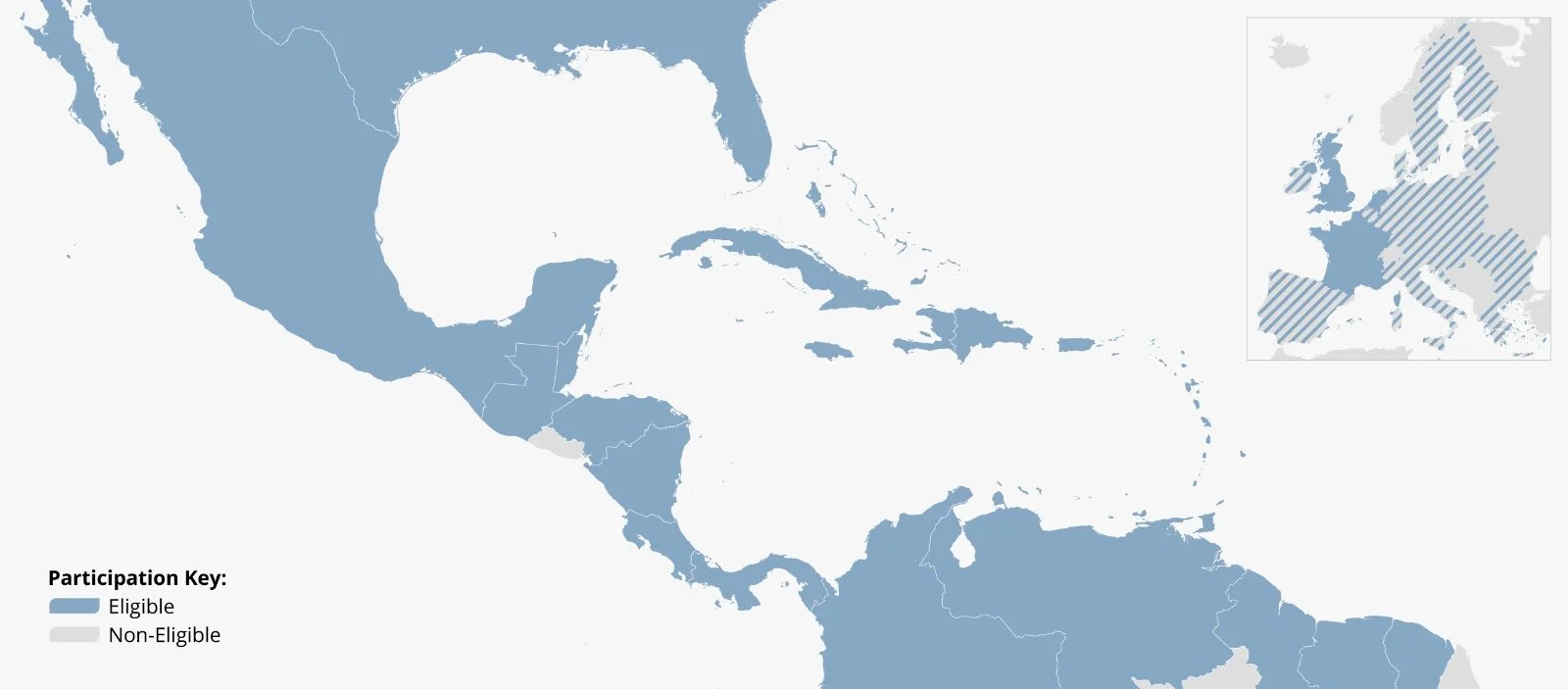
Operational Framework
The CAR-WEN Working Group is laying the foundation for a formalised regional enforcement network to combat wildlife crime in the Wider Caribbean. To guide its operations, it follows three core pillars:
This ensures that the CAR-WEN Working Group’s structure, methodology, and governance are internationally recognised, data-driven, and readily adaptable to support the CAR-WEN once fully institutionalised.
Formalisation & Planning Documents
The CAR-WEN Working Group is actively developing core documents to formalise the network and guide its operations. Documents currently under development are:
Memorandum of Understanding (MOU) (En | Es | Fr) - Defines the governance structure, intergovernmental coordination, and operational framework of the CAR-WEN.
Technical Note to the MOU (En | Es | Fr) - Provides context to the CAR-WEN’s MOU and how to provide feedback.
Draft Strategic Plan (EN) – Outlines regional enforcement strategies, legal frameworks, and capacity-building priorities.
These documents will serve as the foundation for the CAR-WEN’s full establishment as an official regional enforcement network.
Additional planning documents will also be developed, including:
Fundraising Strategic Plan – A framework for securing long-term funding sources, identifying priority funding needs, and diversifying financial sustainability strategies.
Regional Wildlife Crime Assessment Report – A comprehensive analysis of wildlife crime trends, law enforcement gaps, and policy recommendations tailored to Caribbean enforcement challenges.
Organisational Framework – A structural blueprint detailing the governance, membership engagement, and operational roles of the future CAR-WEN once formalised.
By developing and refining these formalisation documents, the CAR-WEN Working Group is ensuring that the transition from working group to fully operational enforcement network is strategic, well-documented, and internationally aligned.
Wildlife Enforcement Network (WEN) Organisational Model
The WEN Concept (ICCWC)
Wildlife Enforcement Networks (WENs) are regional enforcement coordination mechanisms, typically of an intergovernmental nature, that improve law enforcement responses to wildlife crimes through intelligence-sharing, legal harmonisation, and capacity building. Endorsed by the International Consortium on Combating Wildlife Crime (ICCWC), the International Criminal Police Organisation (INTERPOL), the Convention on International Trade in Endangered Species of Wild Fauna and Flora (CITES), the United Nations Office on Drugs and Crime (UNODC), and other multilateral organisations, these networks operate worldwide, including:
ASEAN Wildlife Enforcement Network (ASEAN-WEN) – The first and largest WEN, pioneering regional enforcement coordination in Southeast Asia.
Central America Wildlife Enforcement Network (ROAVIS) – A prosecutorial WEN specialising in legal capacity-building and case coordination in Central America and the Dominican Republic.
Eco Activists for Governance and Law Enforcement Network (EAGLE) – A civil society-led network directly facilitating arrests and prosecutions of wildlife traffickers in Western and Central Africa.
EU Wildlife Trade Enforcement Group – An Enforcement Group responsible for ensuring the implementation of the provisions laid down in the EU Wildlife Trade Regulations.
Horn of Africa Wildlife Enforcement Network (HAWEN) – A network focused on strengthening cross-border enforcement in the Horn of Africa.
Lusaka Agreement Task Force (LATF) – An intergovernmental WEN conducting transnational intelligence-driven operations across sub-Saharan Africa.
South America Wildlife Enforcement Network (SudWEN) – A governmental network strengthening cross-border enforcement and intelligence-sharing on wildlife crime across South America.
South Asia Wildlife Enforcement Network (SAWEN) – A governmental network fostering cross-border collaboration among South Asian nations to effectively curb wildlife crime.
The CAR-WEN Working Group follows a multi-stakeholder operational design commonly employed to operate WENs. This design is specifically characterised by:
Governmental Leadership – Led by two co-chairs from Caribbean government agencies, responsible for strategic oversight and decision-making.
Technical Team – Two coordinators managing planning, outreach, and initiative implementation.
Advisers – Experts from multilateral organisations, enforcement agencies, and academia, providing guidance.
Governmental Focal Points – National representatives from enforcement agencies coordinating regional and intergovernmental cooperation.
Implementing NGO - A legally incorporated entity providing the technical team and ensuring operational support, fundraising, and project execution.
This design aligns with the WEN model while ensuring that intergovernmental collaboration remains central to the initiative.
Open Standards Adoption
To ensure a systematic and evidence-based approach, the CAR-WEN Working Group follows the Open Standards for the Practice of Conservation, a globally recognised framework for structured, adaptive enforcement planning. Importantly, the CAR-WEN Working Group has used the Open Standards framework to define its scope of work according to three dimensions.
Geographic Scope
The CAR-WEN Working Group primarily operates within the Wider Caribbean region, encompassing coastal states, territories, and national and international waters of the Caribbean Sea and adjacent areas of the Atlantic Ocean, south of 30 degrees north latitude. This region consists of 47 national, territorial, and supranational governments with physical territory or political responsibility in the region, including Caribbean island states and territories, continental states in Central, North, and South America, European states, and the European Union. The CAR-WEN Working Group also supports enforcement efforts beyond the region to address the global supply chains, trafficking routes, and financial flows linked to wildlife crimes originating in or affecting the Caribbean.
Values Scope
The CAR-WEN Working Group’s core values guide all of its operations, ensuring that enforcement activities are not only effective but also ethical, socially responsible, and aligned with sustainable development. These values include:
Rule of Law – Strengthening legal frameworks, enforcement mechanisms, and compliance to ensure wildlife laws are effective, fair, and justly implemented.
Biodiversity Conservation – Preventing species loss, protecting ecosystems, and reducing illegal exploitation of natural resources.
Human Well-Being – Supporting sustainable livelihoods, community-based conservation, and alternatives to illegal wildlife trade that benefit both people and nature.
Animal Welfare – Ensuring that wildlife affected by trafficking, poaching, or captivity are treated ethically, rehabilitated where possible, and protected from cruelty.
Public Health – Addressing zoonotic disease risks, biosecurity concerns, and the illegal wildlife trade’s role in public health threats.
Targets Scope
The CAR-WEN Working Group’s operational targets focus on six critical themes, which collectively guide the initiative to enhance wildlife enforcement in the Caribbean.
Wildlife Populations – Protecting and sustaining Caribbean wildlife populations through effective enforcement strategies, targeted interventions, and reduction of illegal wildlife trade.
Communities and Livelihoods – Supporting sustainable community-based livelihoods and conservation solutions that directly reduce incentives to participate in wildlife crime.
Public Health and Well-being – Addressing risks associated with wildlife crime, including zoonotic diseases and biosecurity, while promoting community health and resilience.
Cross-Sector Partnerships – Strengthening collaboration among government agencies, international and regional organisations, scientific communities, private sector actors, civil society groups, and engaged citizens.
Legal Frameworks and Enforcement – Enhancing wildlife law enforcement capabilities, improving legal frameworks, addressing enforcement gaps, and increasing regulatory compliance across jurisdictions.
Knowledge and Collaboration – Promoting intelligence-sharing, knowledge exchange, joint enforcement operations, and adaptive management to effectively combat wildlife crime regionally.

